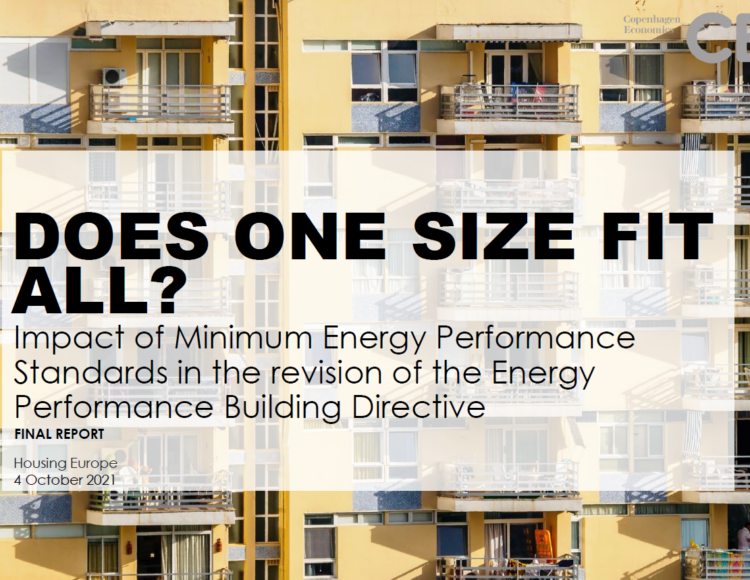Housing Europe has asked Copenhagen Economics to provide a study that focuses on three key questions: What is the overall structure of energy performance for the EU building stock and the resulting potential for energy savings? What are the key economic, social and environmental factors to be considered when implementing measures to improve energy performance standards at local, national and EU level? Which policy recommendations follow from this analysis?
Key factors drive the economic, social and environmental results of measures to support energy renovations.
Energy renovations have sharply declining returns to the point where they do not pay for themselves anymore. We find strong evidence, inter alia from the Netherlands, Germany and Austria, that aiming for the highest EPC label in energy renovations delivers poor returns for society. Increasing the EPC label from B to A is substantially more costly than raising it from e.g. D to C. At the same time, the typical energy savings associated with the energy renovation are relatively smaller. In other words, higher marginal costs for a smaller benefit.
The poor return performance will manifest itself in two types of adverse outcomes:
First, from a pure housing policy perspective, the savings from a lower energy bill will be too small to pay for the investments required to deliver the lower energy bill.
Second, it is costly in terms of climate and wider environmental policy. For high EPC labels, the emission reduction per Euro investment is lower than for low EPC labels and might even be lower
than emission reduction measures elsewhere in the economy. In other words: going for the highest labels is not a cost-effective way of implementing EUs climate policy goals.
Hence, there is overall a strong case for supporting policy measures that reduce barriers to investment
that can lift energy performance standards, but not for enforcing the highest EPC labels.
The success of energy renovations varies across the EU due to varying climate conditions…
Not surprisingly, the economic and environmental value from insulating a house in the European north differs from undertaking the same measure in the European south. Hence, uniform measures across EU countries with substantial variations in weather conditions are likely to provide very unequal benefits in the different locations.
…and varying access to renewable energy
The cost of producing renewable energy has decreased immensely in recent years and even become competitive to fossil fuel energy production.
For example, the cost of onshore wind energy reduced by 13% only in 2020. In turn, this has also reduced the cost of decarbonising the housing stock.
However, not all parts of the EU have, at the moment, equal access to heating based on renewable
energy. This also implies that the most cost-effective away to achieve decarbonisation of the housing stock is very much affected by local energy systems and their development in the coming years.
Different preferences of building owners further determine timing and scope of energy renovations
The best timing and scope of a major renovation effort is narrowly linked to local conditions and preferences that vary substantially across the EU; not only between Member States but also within
Member States.
The variation in local conditions goes beyond differences in climatic conditions and energy systems, e.g. political support or the availability of relevant workforce.
Housing associations, in contrast to private home owners, make extensive renovation plans where energy efficiency is documented for the whole portfolio of buildings rather than for individual
buildings.
Affordability of housing is essential in the social housing sector
Tenants in the social housing sector are vulnerable and hence, investment costs cannot easily passed on without worsening affordability. Access to financing is thus crucial for social housing associations, alongside well-balanced minimum energy efficiency requirements.
Copenhagen Economics proposes three concrete policy recommendations
While there is a strong case for supporting major energy renovations of the EU building stock, there is also a need for targeted measures that specifically address the key factors outlined above:
• The measures should be flexible to account for the heterogeneity in the EU.
• The measures should allow for diverging preferences, e.g. as to the exact timing and scope of energy renovations.
• The measures should remove existing barriers to energy renovations.
